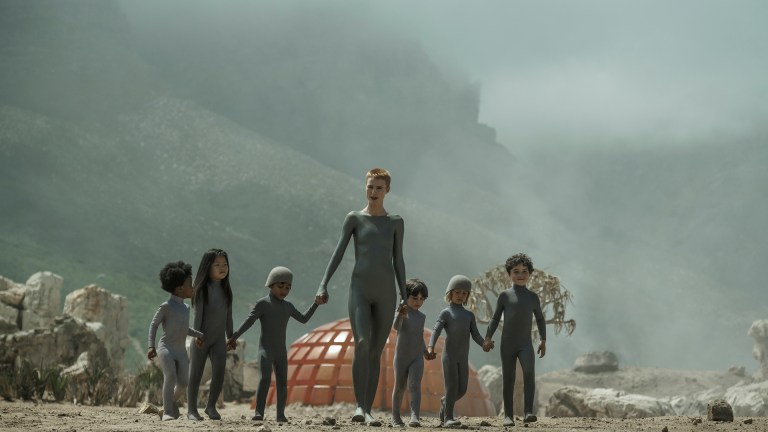Raised by Wolves: Ridley Scott and Aaron Guzikowski Talk Parenting on a New Planet
Raised by Wolves showrunner Aaron Guzikowski and director Ridley Scott on breaking humanity’s toxic patterns through atheist AI parents.

HBO Max’s new science fiction series Raised by Wolves is the kind of genre collaboration where it’s fascinating to trace its disparate elements back to their various sources. Showrunner Aaron Guzikowski broke into Hollywood with the 2013 film Prisoners, about the lengths to which a father will go to rescue his kidnapped daughter—themes that are just as relatable whether it’s a pair of androids or space Crusaders on that same parental journey.
Then there’s Sir Ridley Scott, who describes his process as “shifting from visual image to visual image in my head.” The iconic director brought everything from childhood remembrances of post-World War II radio serials to New York City’s iconic Atlas statue to the show’s terrifying android Mother (Amanda Collin). That necromancer-turned-nurturer is herself an evolution of the increasingly uncanny androids that have characterized Scott’s body of work from Alien to Blade Runner. Further, while Raised by Wolves is Scott’s television directorial debut for an American audience, he credits his decades of commercial work (estimating at least 2,000 commercials) as his “real directing school.”
Guzikowski and Scott spoke with Den of Geek about how Raised by Wolves reaches back into Earth’s history in order to break humanity’s toxic patterns on future planets, and how AI stories reflect contemporary parenting in all its ego and good intentions.
Den of Geek: Aaron, what initially inspired the series?
Aaron Guzikowski: I’ve been into science fiction for all my life, basically. My father got me into it, so it’s always been an obsession of mine—and often just the way in terms of how I think about the world and try to think through these science fiction scenarios and try to understand the present day a little bit better. But I also have three young sons and, you know, just thinking about them and the encroachment of technology and what the future might bring: if should they ever be given the opportunity to start a new civilization, start from scratch, but they know what happened on Earth, you have all of that information—making that decision [of] what are you gonna take with you and what are you gonna try and leave behind? Is that even something we’re able to do, or are we so genetically programmed as human beings to keep falling back into these cycles? Is there some rut that we can’t get out of, or is this something that we can free ourselves from and find some renewed sense of purpose?
I think a lot of sci-fi is asking exactly that right now. Ridley, how did you get involved?
Sir Ridley Scott: The script was fantastic. I was going to come in as a producer with my company [Scott Free Productions], but I was blown away by honestly the first three episodes, and I felt I didn’t want to let this get away. I wanted to be involved in the casting of the characters, how it looks—very important—because with such a great script, you don’t want it to go off the rails and become a bit more normal or the usual suspects. Really, the inspiration was the material.
Aaron’s spec script inspired some visual interpretations from you, which led to further shaping the series. Can you describe your collaboration?
Sir Ridley Scott: I read visually—that’s the way my mind works—so when I’m reading I’m getting… You know, the most visual medium in the world is radio, because your brain is gonna be better than any screen. And on a screen you are already focused on that and your brain is processing that, but it’s not thinking. I come from the generation just out of the war, [and] my mother’s favorite thing to do was to sit on a Thursday night and listen to a radio show called Inner Sanctum. But she was so afraid to listen to the radio [alone], she’d make my brother and I sit with her to accompany her. It would begin with a creaking door and footsteps, and a deep voice would say, “Good evening friends, this is [your host Raymond Edward Johnson], the story for this evening is…” and he’d go into a new story, and we’d all be scared to death after the next hour.
So my mother had to have all the children sitting—we were all scared to death—but I’ll never forget the visuals that would go through your mind as you’re listening to the sound effects, the voices, etcetera, etcetera. And so to me, on paper has the same effect; I read it, and the images are whirring.
Aaron, did you draw from specific historical religious conflicts (the Crusades, etc.) in crafting this future and its defining conflict between the Mithraic cult and the atheists? Or was it more generally inspired by zealotry itself?
Aaron Guzikowski: I think zealotry in general, but certainly the Crusades—definitely in terms of the design, the uniforms. This idea, too, that we keep reaching into Earth’s past to tell the story of the future here a little bit. They are restarting this new planet and [there’s] this kind of mirroring of the ancient history of Earth as this new planet gets started; but also, too, our propensity on Earth for memorializing and worshipping ancient things. The older something becomes, the more mysterious; the more able we are to extrapolate holiness out of it, the less we know about it. So it’s a little bit of all of that in there.
Speaking of the Mithraic cult, the necromancers are terrifying. Ridley, when you were directing the first two episodes and especially directing Amanda Collin as Mother—as this simultaneously destructive force and nurturing force—what were you trying to get out of her performance? You’ve been behind so many iconic android performances over the decades, especially from Ian Holm and Michael Fassbender in the Alien franchise, as well as the Blade Runner films.
Sir Ridley Scott:I knew that there’d be a moment where Mother would move from being a very thoughtful, female version of an android—an AI—and there was a gentle quality to her cadence, and very thoughtful; essentially, [she] would be a great mother. But I also knew that down the line, she would adjust—and could adjust, almost without being able to help herself—into being a kind of weapon. One of the most impressive pieces of sculpture in New York [City] is outside [Rockefeller Center]. Ithas the most incredible statue of a bronze character holding up a giant ball. [Atlas, carrying the world on his shoulders, a collaboration between artists Lee Lawrie and Rene Paul Chambellan.] I used to stare at that thinking, “That’s Mother.” Except, she’ll be supremely female. And so I kind of modeled Mother on that. But she’s pretty impressive, isn’t she? Scary as hell.
Aaron, with Prisoners and now Raised by Wolves, you’ve created these genre stories about the lengths that parents will go to for their children. We see that with Mother and Father obviously, but also with Marcus and Sue. What is it about those stories that compels you?
Aaron Guzikowski: I do like characters who are pushed to do something no matter what, where you have no choice: You are essentially being tasked with rescuing some part of yourself—that connective tissue between the parent and the child, in that they are kind of the same being in some sense, so stories like that interested me on that level. And here too, just the whole idea of creators and their creations; I think as it applies to AI, but even as it applies to human parents and their children: We have the genetics, the stuff that they’re born with, the stuff that they come out already ready-made; and then the environmental stuff, what we choose to then teach them, how we direct them. But also at the same time, they come from us, so the way we see them is completely clouded by our own ego on some level. I love taking all of that stuff and infusing it into this story, because I think it kinda supercharges everything. It’s such a primal thing, parents and their children; as I said, it’s almost like it’s a part of yourself. So in terms of the storytelling, it definitely opens up a lot of interesting doors.
Raised by Wolves premieres its first three episodes September 3 on HBO Max.
